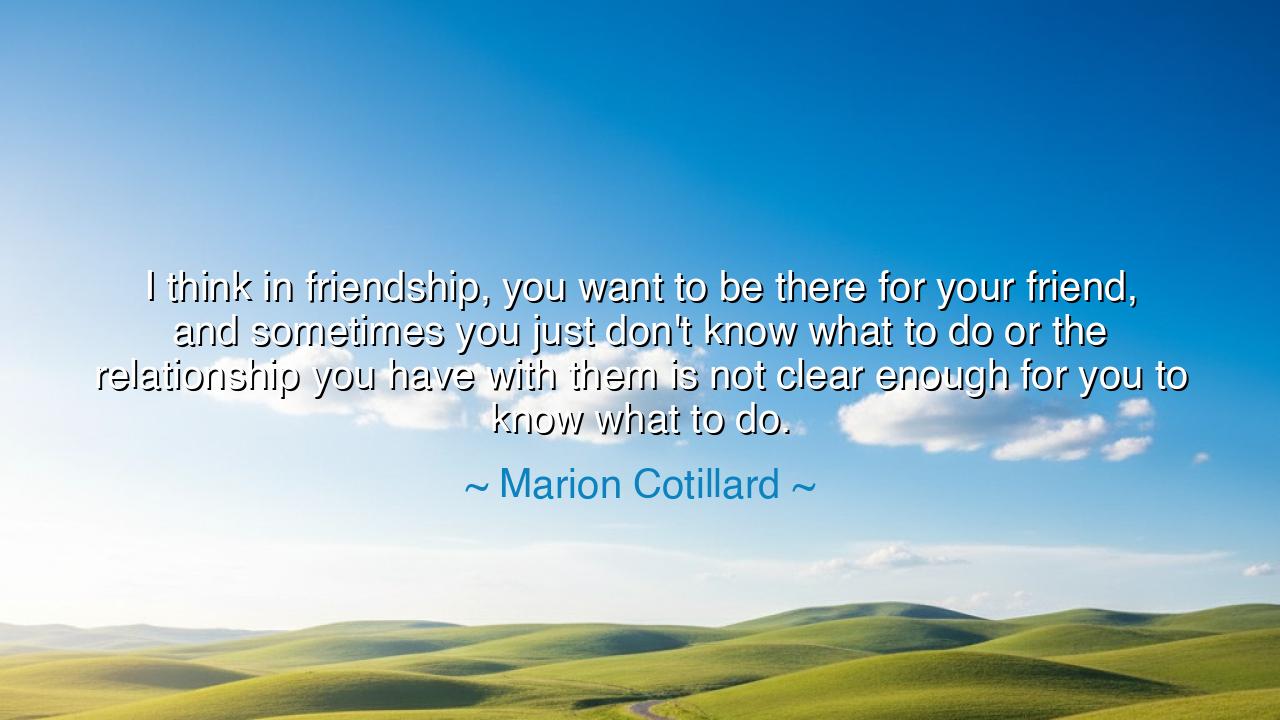
I think in friendship, you want to be there for your friend, and
I think in friendship, you want to be there for your friend, and sometimes you just don't know what to do or the relationship you have with them is not clear enough for you to know what to do.






“I think in friendship, you want to be there for your friend, and sometimes you just don’t know what to do or the relationship you have with them is not clear enough for you to know what to do.” Thus speaks Marion Cotillard, an artist not of mere performance but of profound reflection. In these words lies a truth that humbles even the wise: that friendship, though born of love and loyalty, is often shrouded in uncertainty. The heart may ache to help, yet the mind falters, unsure how to act. For the paths of affection are not always well-lit, and even the most devoted friend may find themselves standing at the threshold of another’s sorrow, unable to enter.
This saying reveals the delicate nature of human connection. To be a friend is to desire the good of another, to wish to ease their burdens and share in their joy. But friendship is not a science; it is a living, breathing mystery, governed not by reason but by empathy. Sometimes, despite all our good intentions, we find ourselves powerless—not because our love is weak, but because the heart we wish to reach is distant, closed, or wounded in ways we cannot yet comprehend. True friendship, therefore, requires not only devotion but patience—the courage to remain near even when words fail.
Consider the tale of King David and Jonathan, whose friendship is sung throughout the ages. When Jonathan’s father, King Saul, sought to destroy David, Jonathan’s heart was torn between blood and bond. He loved his father, but he also loved his friend, and in that struggle he did not always know what to do. Yet his love endured. He stood beside David not with certainty, but with faith—faith that his loyalty, though imperfect, would one day bear fruit. And indeed it did. Jonathan’s name is remembered not for perfect wisdom, but for steadfast affection that persisted even amid confusion and peril.
Marion Cotillard’s words remind us that uncertainty does not weaken friendship—it humanizes it. To stand before the suffering of another and not know what to say is not a failure of love, but a testament to its depth. The one who truly cares feels the weight of every silence, every unspoken plea. And so, the truest friend is not always the one with answers, but the one who stays—awkwardly, quietly, faithfully—until the storm passes. In that humble presence lies a kind of sacred power, for it tells the wounded soul: “You are not alone.”
In our modern age, where communication is constant yet connection feels fleeting, Cotillard’s insight calls us back to something ancient: the art of presence. Too often, we think that to help a friend we must fix their pain, solve their crisis, or speak the perfect words. Yet friendship is not about mastery; it is about companionship. When you do not know what to do, stay. When you do not know what to say, listen. When you are unsure of your place in another’s life, still wish them well. Such quiet loyalty is the unseen thread that binds souls across time and distance.
Let us also remember that the unclear relationship Cotillard speaks of is not a flaw, but a reflection of the human condition. We are all changing, all searching. Friendships evolve, sometimes stretching, sometimes fading, sometimes returning when least expected. To cling too tightly to what was is to smother what could be. The wise friend learns to walk beside others without demanding certainty, to offer love without expectation, and to trust that what is genuine will endure, even through silence and distance.
From this teaching, let every heart learn humility. When faced with the confusion of friendship, do not retreat into pride or fear. Instead, act with gentleness. Send a message. Offer a meal. Sit in silence. Hold space for their struggle without demanding clarity. The measure of friendship is not perfection, but sincerity—the willingness to care even when the path ahead is unclear.
For in the end, as Marion Cotillard’s words reveal, friendship is both a light and a labyrinth. It asks of us not flawless understanding, but faithful presence. And those who walk that path—uncertain yet devoted, trembling yet steadfast—will find that even amid confusion, their friendship becomes a sanctuary, a quiet beacon in the vastness of the human heart.






AAdministratorAdministrator
Welcome, honored guests. Please leave a comment, we will respond soon